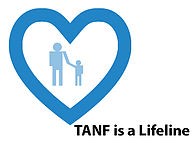This blog is re-posted from the DC Fiscal Policy Institute: http://www.dcfpi.org/guest-blog-cutting-tanf-would-hurt-domestic-violence-survivors. Written by Andrea Gleaves, Strategic Partnerships Associate of DC Coalition Against Domestic Violence.
The Temporary Assistance for Needy Families (TANF) program ensures that children have their most basic needs met despite the economic hardships their parents face. However, under current law, DC will cut 13,000 children from all cash assistance this October, simply because their families have reached the TANF time limit.
This harsh rule ignores the reality that cutting off families before they are ready will push thousands deeper into poverty. This is why Bread for the City supports the DC Public Assistance Amendment Act of 2015, which will create exemptions and extensions for families who need more time to continue on the path to self-sufficiency. This series of guest blogs will share various perspectives on the need for a more flexible time limit. More information can be found at TANFisalifeline.org.
When a mother flees from domestic violence, or loses her job due to an abusive partner, her safety can depend on having access to economic resources. Domestic violence affects individuals and families in the District at every socioeconomic level, from all wards and walks of life, but low-income parents are especially vulnerable to the impact of abuse. For victims without financial resources, Temporary Assistance for Needy Families (TANF) and other public benefits provide a financial separation from abuse—and a bridge to independence.

That’s why the DC Coalition Against Domestic Violence is concerned about DC’s rigid TANF time limit, that will cut off victims of domestic violence and other families in dire situations starting this fall. Instead, we support TANF legislation introduced last December extend assistance to families under certain conditions, and to follow the lead of many states that never cut children off from aid. Information on the legislation, and on ways to sign on as an organization, can be found at www.TANFisalifeline.org.
More than one-fourth of DC homeless families have a history of domestic violence, a higher percentage than those with severe mental illness, chronic substance abuse, disability and chronic health problems combined. On just one day last year, 511 victims and families sought shelter and support from domestic violence shelters in the District. Due to a shortage of funds and staff, however, the programs could not meet all the needs and had to turn some away.
Programs like TANF provide a source of financial stability for many low-income survivors of domestic violence who may struggle to support their family after abuse. Domestic violence survivors who reach the time limit more frequently return to abusive partners in a time of desperate financial need. Without TANF, families impacted by domestic violence are at risk of further harm or re-victimization.
The vital role TANF plays in providing economic stability to survivors is why domestic violence advocates are working to reform TANF. Even with the best TANF services, barriers like domestic violence get in the way of finding or holding a job. Continuing to provide supportive services and financial support to vulnerable families recovering from abuse is a national best practice. We need to reform the District’s TANF program so that our families are supported as they heal from domestic violence and rebuild their lives.